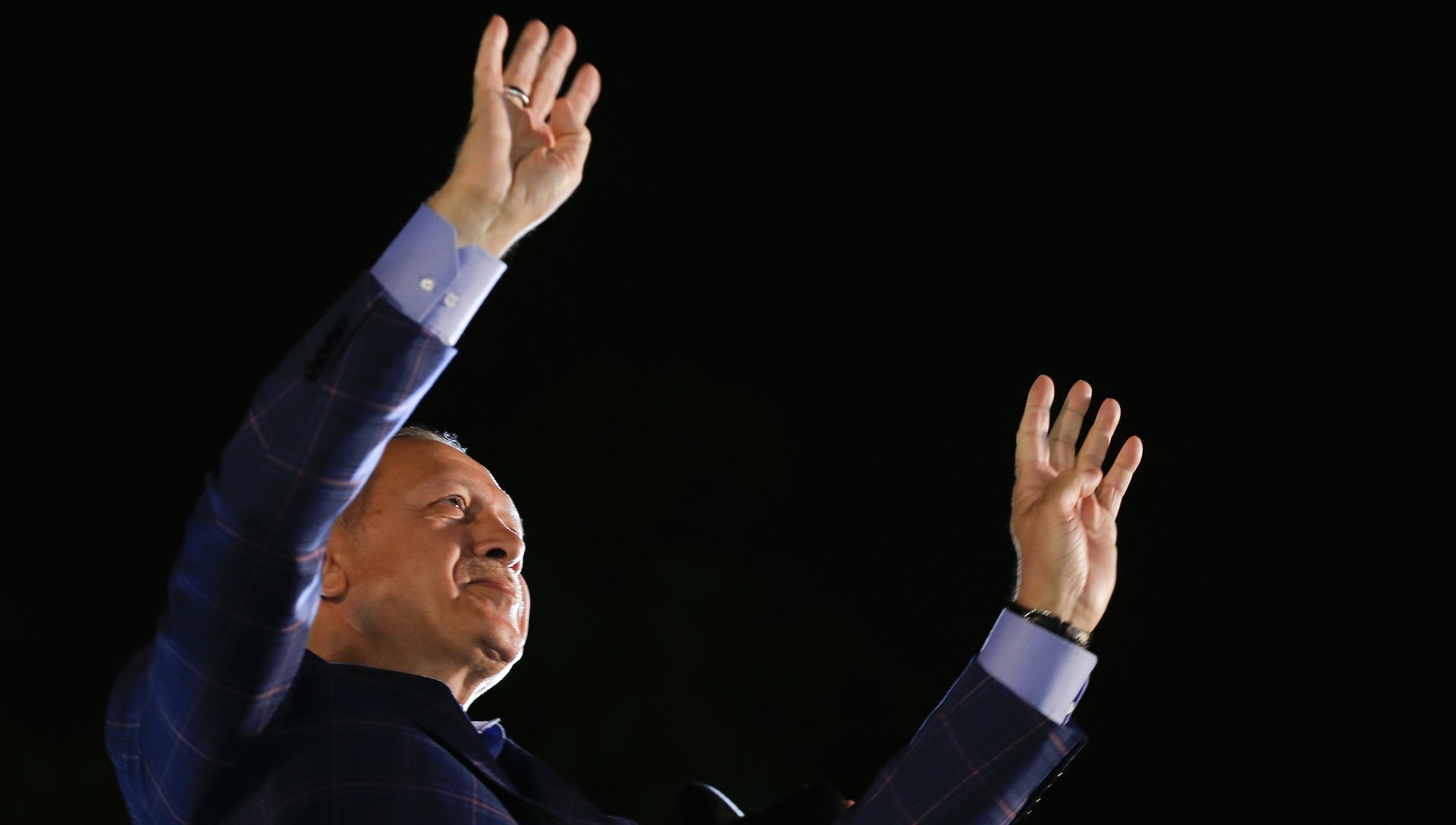The West shouldn’t ignore Turkey’s budding authoritarianism
US president Donald Trump called to congratulate Turkish president Recep Tayyip Erdogan on his referendum victory this weekend (April 16).


US president Donald Trump called to congratulate Turkish president Recep Tayyip Erdogan on his referendum victory this weekend (April 16).
Why have no other Western leaders followed suit? Perhaps because in voting “Yes” on its referendum, Turkey turned back the clock nearly a century—rejecting the trappings of modern democracy for a system that echoes the Ottoman era.
Once the new changes take effect, likely in 2019, the powers of Turkish President Recep Tayyip Erdogan will be nearly sultanic. Turkey’s executive president will be able to issue decrees with the force of law and appoint judges without parliamentary input. He will exclusively control the armed forces and senior bureaucratic appointments. The post of prime minister will be abolished—as will most checks and balances.
The shift is not a total shock. The Turkish state has been listing toward authoritarianism at least since last summer’s failed coup. The brief coup resulted in a vast purge of some 100,000 Turks purportedly linked to alleged coup plotter Fethullah Gulen, widespread reports of torture and prisoner abuse, the imprisonment of opposition politicians, the shuttering of dozens of news outlets and arrests of dozens of journalists, and a state of emergency that has been repeatedly extended.
Despite the grim reports, Western officials have so far done little more than throw up their hands; they need Ankara too much to turn their backs. Turkey is the lynchpin figure in the migrant crisis: Erdogan has repeatedly threatened to unleash 3 million Syrian refugees on Europe. Turkey is also a NATO ally and a crucial partner in the fight against ISIL. It borders both Syria and Iraq and wields a sizable army that has had some recent success against ISIS.
Many are wondering what to expect now that Erdogan’s path to untrammeled power seems clear. He’s always been rather mercurial vis-a-vis the West, and some believe this referendum result—the “Yes” side lost in Turkey’s three largest cities (Istanbul, Ankara, and Izmir) and the victory was slim (51.4% to 48.6%)—will further his maverick tendencies.
With the next presidential election and the constitutional changes looming in 2019, Erdogan can either take stock of Turkey’s deep polarization and switch to a more consensus-driven style, or continue with the divisive rhetoric that has never failed him in the past. (Erdogan’s AKP political party has now won all 12 elections and referenda in which it has taken part).
But Erdogan has so far shown little sign that he’s open to rhetorical compromise.
“His initial statements after the referendum, with references to bringing back the death penalty and accusing the West of the Crusader mentality, indicate that he’ll favor the second option,” says Sinan Ulgen, a visiting scholar at Carnegie Europe. “That would going forward involve more tension with Turkey’s partners in the West and a less predictable Turkish foreign policy.”
For his domestic audience, Erdogan often takes an anti-Western stance: While campaigning in March, he compared German and Dutch officials to Nazis.
“The public spats with Western powers play well to his own base,” says Howard Eissenstat, Turkish scholar and history lecturer at St Lawrence University. “After the narrow—and quite possibly fraudulent—victory on April 16, Erdogan will have to remain in continuous campaign mode right up until the next elections. In part, this means he’ll be picking fights with Western allies.”
But Erdogan’s many domestic critics claim the election is fraudulent, stoking international fears that internal instability could further threaten the EU cohesion. Indeed, the Organization for Security and Cooperation in Europe which monitored the vote concluded that the referendum was less than fair. (Erdogan scoffed at the accusation.)
Sizable protests have already flared in some of Turkey’s big cities, with people angry over potential voter fraud. Some observers fear Turkey could become Venezuela, where the consolidation of power in an authoritarian has led to greater political chaos.
Perhaps sensing this danger, German chancellor Angela Merkel issued a statement April 17 urging Turkey to respect European democratic standards and warning that Ankara’s EU accession process hangs in the balance.
Even this threat may be losing it’s edge, however. St Lawrence University’s Eissenstat believes Turkey’s accession talks are finished—which means western leaders are losing what little leverage they once held. The last straw for Erdogan may have been the European parliament’s overwhelming vote (471 to 37) last November to halt Turkey’s accession talks because of the Turkish government’s “disproportionate repressive measures” in the wake of the failed coup. Meanwhile, a 2013 poll found just 44% of Turks support EU accession, down from 75%. The EU is tired of Erdogan’s strongman antics, and Erdogan has realized that Turks are weary of the EU’s hard to get routine.
This means Erdogan is still holding most of the cards. He may be emboldened to act more aggressively in Syria and Iraq, stirring up trouble for NATO. He could threaten to take the fight to America’s Kurdish allies, undermining gains against ISIL. He could again demand visa-free travel for Turks across Europe, threatening to tear up the EU refugee deal. Domestically, he’s likely to risk offending European and American leaders and pursuing his purge as far as Western leaders are willing to tolerate. While many questions about the future remain, the one thing we can be sure of is that the consequences of Turkey’s budding authoritarianism will reach far beyond Turkey.